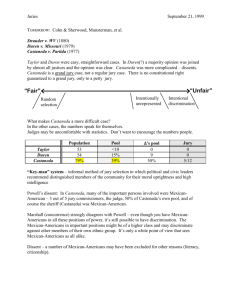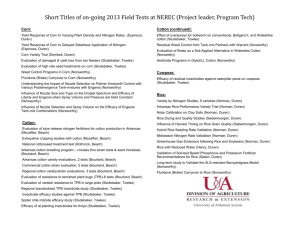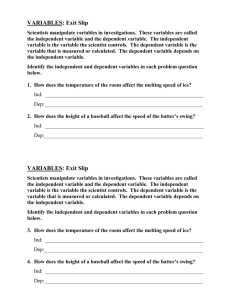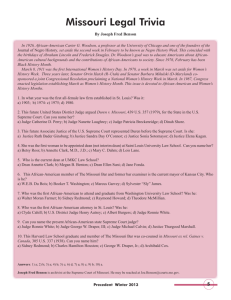FOR PUBLICATION ATTORNEY FOR APPELLANT: ATTORNEYS
advertisement
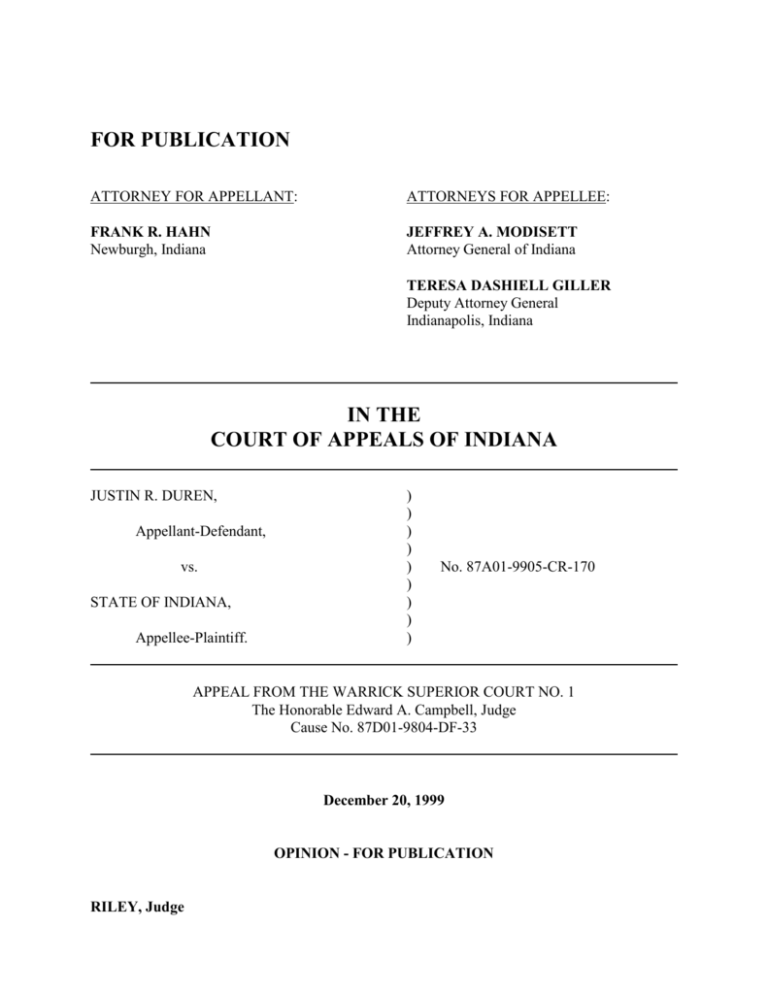
FOR PUBLICATION ATTORNEY FOR APPELLANT: ATTORNEYS FOR APPELLEE: FRANK R. HAHN Newburgh, Indiana JEFFREY A. MODISETT Attorney General of Indiana TERESA DASHIELL GILLER Deputy Attorney General Indianapolis, Indiana IN THE COURT OF APPEALS OF INDIANA JUSTIN R. DUREN, Appellant-Defendant, vs. STATE OF INDIANA, Appellee-Plaintiff. ) ) ) ) ) ) ) ) ) No. 87A01-9905-CR-170 APPEAL FROM THE WARRICK SUPERIOR COURT NO. 1 The Honorable Edward A. Campbell, Judge Cause No. 87D01-9804-DF-33 December 20, 1999 OPINION - FOR PUBLICATION RILEY, Judge STATEMENT OF THE CASE Appellant-Defendant, Justin R. Duren (Duren), appeals his conviction for theft, a Class D felony. Ind. Code § 35-43-4-1. We affirm. ISSUES Duren raises four issues for our review, which we restate as follows: 1. Whether the State presented sufficient evidence to support his conviction for theft. 2. Whether he was improperly charged. 3. Whether the trial court properly instructed the jury. 4. Whether the trial court committed error in sentencing Duren. FACTS AND PROCEDURAL HISTORY In December, 1996, Duren met with Terry and Marsha Haire to discuss the installation of custom replacement windows and doors at the Haire's home in Boonville, Indiana. Duren was at the time a self-employed contractor. The Haires are Duren's wife's aunt and uncle. Duren had informed the Haires that he would order the windows and doors from Benthall Bros., an Evansville company, and a representative from Benthall Bros. attended this meeting. Duren informed the Haires that they would have to pay in advance for the windows and doors because Benthall Bros. required advance payment to place the order. The Haires presented Duren with a check for $3,862.16 which was to cover the cost of the materials and 2 allow Duren some profit. Benthall Bros. ordered the materials COD and Duren informed the Haires that the materials would be available in five to six weeks. The windows were received by Benthall Bros. on January 21, 1997, but Duren never picked them up or paid for them. In the interim, Duren had spent the money the Haires gave him for the windows and doors. Duren never refunded the Haire's money or installed the replacement windows and doors in their home. The Haires attempted to contact Duren several times, but he failed to reply to any of their telephone calls or other contacts. On May 1, 1998, Duren was arrested and charged with theft, a Class D felony. He was tried before a jury on April 5 and 6, 1999, and was found guilty. The trial court sentenced Duren to one and one-half years incarceration. This appeal followed. DISCUSSION AND DECISION I. Sufficiency of the Evidence Duren argues that the evidence was insufficient for the jury to convict him of theft. Specifically, Duren argues that there was no evidence that his control over the funds at issue was "unauthorized" or that the Haires retained an interest in the funds once they were transferred to Duren. Duren additionally argues that there was no evidence of his intent to deprive the Haires of their property. Our standard of review with regard to sufficiency claims is well settled. We neither weigh the evidence nor judge the credibility of the witnesses. McClendon v. State, 671 3 N.E.2d 486, 488 (Ind. Ct. App. 1996). We consider only the evidence favorable to the verdict and all reasonable inferences which can be drawn therefrom. "If there is substantial evidence of probative value from which a trier of fact could find guilt beyond a reasonable doubt, we will affirm the conviction." Newman v. State, 677 N.E.2d 590, 593 (Ind. Ct. App. 1997)(citing Grant v. State, 668 N.E.2d 254, 255 (Ind. 1996)). We are also mindful that the jury is the trier of fact and is entitled to determine which version of the incident to credit. Barton v. State, 490 N.E.2d 317, 318 (Ind. 1986). Furthermore, the jury, not this Court, determines the credibility of the witnesses, and a theft conviction may be sustained by circumstantial evidence. Ward v. State, 439 N.E.2d 156, 159 (Ind. 1982). Ind. Code § 35-43-4-2(a) sets forth the elements of theft, in pertinent part, as follows: "A person who knowingly or intentionally exerts unauthorized control over property of another person, with intent to deprive the other person of any part of its value or use, commits theft, a Class D felony." As stated, Duren argues that there was no evidence that his control over the funds at issue was "unauthorized" or that the Haires retained an interest in the funds once transferred to Duren. Ind. Code § 35-43-4-1(b) defines "unauthorized" in pertinent part as follows: (b) Under this chapter, a person's control over property of another person is "unauthorized" if it is exerted: (1) without the other person's consent; (2) in a manner or to an extent other than that to which the other person has consented; ... 4 (4) by creating or confirming a false impression in the other person; (5) by failing to correct a false impression that the person knows is influencing the other person, if the person stands in a relationship of special trust to the other person; (6) by promising performance that the person knows will not be performed; ... We need look no further than Ind. Code § 35-43-4-1(b)(2) to conclude that the jury was presented with sufficient evidence to determine that Duren's possession of the Haire's funds was "unauthorized." The evidence shows that Duren told the Haires that he needed money up front to cover the cost of ordering the doors and windows because he could not afford to pay for those materials himself. The check the Haires gave Duren for $3,862.16 was to cover the cost of the materials and allow Duren some profit. Instead of paying for the windows, either at the time that they were ordered or at the time they were received by Benthall Bros., Duren used the funds for his own personal use. Thus, Duren's use of the funds was "unauthorized," because the funds were used "in a manner or to an extent other than that to which the [Haires had] consented." Ind. Code 35-43-4-1(b)(2). 5 Therefore, we conclude that Duren's control of the funds was "unauthorized," as defined by Ind. Code § 35-43-4-1(b)(2).1 Duren additionally argues that there was no evidence that he had the necessary criminal intent to deprive the Haires of their property. "Intent is a mental function and without a confession, it must be determined from a consideration of the conduct, and the natural consequences of the conduct." Brant v. State, 535 N.E.2d 189, 191 (Ind. Ct. App. 1989). Accordingly, intent may be proven by circumstantial evidence. Johnson, 593 N.E.2d at 209. Further, "[i]ntent may be inferred from a defendant's conduct and the natural and usual sequence to which such conduct logically and reasonably points. The jury is entitled to infer intent from the surrounding circumstances." Hart v. State, 671 N.E.2d 420, 426 (Ind. Ct. App. 1996). The evidence presented to the jury establishes that Duren accepted the Haire's money for the purpose of purchasing replacement windows and doors for the Haire's home. Duren used the funds for other purposes and never paid for the replacement windows and doors. The Haires made several attempts to contact Duren to determine when he would install the windows and doors, but Duren never responded to the Haires. Duren failed to perform on any part of his agreement with the Haires. All of this evidence leads to the inference that 1 Since we have determined that Duren's control of the Haire's funds was "unauthorized" under Ind. Code § 35-43-4-1(b)(2), we need not address whether Duren's control of the Haire's funds was "unauthorized" under any of the other subparagraphs of Ind. Code § 35-43-4-1(b). "When proof is made under one of 4-1(b)'s subparagraphs, the others are mere surplusage. No further proof is required." Johnson v. State, 593 N.E.2d 208, 209 (Ind. Ct. App. 1992). 6 Duren knew his control over the funds was "unauthorized" and that he intended to deprive the Haires of the value of their property. Consequently, the jury's determination was supported by sufficient evidence. II. Improper Charge Duren argues that the State improperly charged him with theft when he should have been charged under the more specific statute concerning home improvement fraud. See Ind. Code § 35-43-6. During trial, Duren twice moved to dismiss the State's Amended Information based on this argument. Both motions to dismiss were denied by the trial court. In determining whether Duren was properly charged, we must construe the theft statute and the home improvement fraud statute. When construing statutes, our primary goal is to determine . . . legislative intent. Moreover, when two statutes address the same subject matter, they are in pari materia and we strive to harmonize them wherever possible. The legislature is presumed to have existing statutes in mind when it adopts a new law. However, a general rule of statutory construction states that when statutes cannot be harmonized and the legislature dealt with the subject matter in a detailed manner in one and a general manner in the other, the detailed statute prevails. State v. Wynne, 699 N.E.2d 717, 719 (Ind. Ct. App. 1998), trans. denied (citations omitted). However, here the home improvement fraud statute2 and the theft statute do not necessarily cover the same subject matter. The home improvement fraud statute is intended 2 Ind. Code § 35-43-6-12 provides: (a) A home improvement supplier who enters into a home improvement contract and knowingly: 7 to punish home improvement suppliers for fraud against home owners, including misrepresentations, intentional nonperformance, deceptive practices, unconscionable contract prices, and failure to comply with Ind. Code § 23-15-1 relating to the use of assumed names or misrepresenting or concealing of the home improvement supplier's personal or business name or business address. (1) misrepresents a material fact relating to the terms of the home improvement contract or the preexisting or existing condition of any part of the property involved; (2) creates or confirms a consumer's impression that is false and that the home improvement supplier does not believe to be true; (3) promises performance that the home improvement supplier does not intend to perform or knows will not be performed; (4) uses or employs any deception, false pretense, or false promise to cause a consumer to enter into a home improvement contract; (5) enters into an unconscionable home improvement contract with a home improvement contract price of four thousand dollars ($4,000) or more; or (6) fails to comply with the provisions of IC 23-15-1 relating to the use of an assumed name in the conduct or transaction of business in Indiana and misrepresents or conceals either the home improvement supplier's real name, business name, or business address; commits home improvement fraud, a Class B misdemeanor, except as provided in section 13(a) of this chapter.[*] (b) A home improvement supplier who, with the intent to enter into a home improvement contract, knowingly: (1) damages the property of a consumer; (2) does work on the property of a consumer without the consumer's prior authorization; (3) misrepresents that the supplier or another person is an employee or agent of the federal government, the state, a political subdivision of the state, or any other governmental agency or entity; or (4) misrepresents that the supplier or another person is an employee or agent of any public or private utility; commits a Class A misdemeanor, except as provided in section 13(b) of this chapter. *Section 13(a) provides for enhancement of these charges to Class A misdemeanors and Class C and D felonies, depending on the contract price and the age of the home owner. 8 The theft statute is intended to punish individuals for "knowingly or intentionally exert[ing] unauthorized control over property of another person, with intent to deprive the other person of any part of its value or use." Ind. Code § 35-43-4-2(a). Under the home improvement fraud statute, a home improvement supplier can be guilty of home improvement fraud without exercising unauthorized control over another's property. As mentioned, a home improvement supplier can be guilty of home improvement fraud based on the various circumstances as set forth in the statute. For example, a home improvement supplier can be guilty of home improvement fraud for misrepresenting or concealing the home improvement supplier's real name, business name, or business address. Ind. Code § 35-43-6-12(a)(6). From this example it is apparent that the theft statute and the home improvement fraud statute contain elements that are quite different and do not address the same subject matter. Therefore, because the statutes do not address the same subject matter there is no need to attempt to harmonize the statutes or to determine which statute is more detailed. Thus, we conclude that the State properly charged Duren with theft and the trial court did not err in denying Duren's motions to dismiss. III. Jury Instructions 9 Duren argues that the trial court instructions numbers 8 and 9 were improperly given by the trial court. The decision to give or refuse a tendered jury instruction is within the trial court's sound discretion and is only reviewed for an abuse of discretion. Hollowell v. State, 707 N.E.2d 1014, 1023 (Ind. Ct. App. 1999). "An abuse of discretion will be found only where the individual instruction is erroneous or where the instruction, taken as a whole misstates the law or otherwise misleads the jury." Id. Furthermore, before Duren is entitled to a reversal, he must demonstrate that the error concerning the jury instructions prejudiced his substantial rights. See Id. (citing Jewell v. State, 672 N.E.2d 417, 425 (Ind. Ct. App.1996), trans. denied.) "Jury instructions are to be considered as a whole and in reference to each other; error in a particular instruction will not result in reversal unless the entire jury charge misleads the jury as to the law in the case." Edgecomb v. State, 673 N.E.2d 1185, 1196 (Ind. 1996), reh'g. denied. To determine whether a tendered instruction is proper, it must correctly state the law, be supported by the evidence, and not be covered by other instructions. Warthen v. State, 588 N.E.2d 545, 546 (Ind. Ct. App. 1992). Duren argues that the trial court's final instruction number 8 incorrectly states the definition of "unauthorized" as it applies to this case. The trial court's final instruction number 8 stated: "Exert control over property" means to obtain, take, carry, drive, lead away, conceal, abandon, sell, convey, encumber, or possess property, or to secure, transfer, or extend a right to property. A person's control over property is "unauthorized" if it is exerted: without the other person's consent; in a manner or to an extent other than that to which the other person has consented; by creating or confirming a false impression in the other person; by failing to 10 correct a false impression that the person knows is influencing the other person, if the person stands in a relationship of special trust to the other person; by promising performance that the person knows will not be performed. (R. 97). This definition of "unauthorized" comes directly from the definition of "unauthorized" as set forth in the theft statute, Ind. Code § 35-43-4-1. Thus, it is clearly a proper statement of the law. Duren, nonetheless argues that the evidence did not support the instruction. He takes issue with the part of the instruction defining "unauthorized" control, which states: "by failing to correct a false impression that the person knows is influencing the other person, if the person stands in a relationship of special trust to the other person." (R. 97). Duren argues that there was no evidence that the parties stood in a relationship of "special trust." However, in addition to Duren's familiar relationship to the Haires, Duren also had a business relationship with the Haires. Thus, there was evidence that Duren stood in a position of special trust to the Haires. See Gilliana v. Paniaguas, 708 N.E.2d 895, 900 (Ind. Ct. App. 1999), reh'g denied, trans. denied. Moreover, as previously addressed, the jury need only find that the possession was "unauthorized" under one of the subparagraphs of Ind.Code § 35-43-4-1(b) and when proof is made under one of the subparagraphs, no proof of the other subparagraphs is required. Johnson, 593 N.E.2d at 209. 11 Duren also asserts that the trial court erred in refusing to give his tendered instruction number 5 in place of the trial court's final instruction number 8. Duren's tendered instruction number 5 states: As applicable in this case, a person's control over property of another is "unauthorized" if it is exerted ". . . by creating or confirming a false impression in the other person . . ." or "by promising performance that the person knows will not be delivered." In the first case, of creating or confirming a false impression, the State of Indiana must prove that Mr. Duren created or confirmed a false impression about a current or pre-existing fact, as opposed to something supposed to be done or to take place in the future. In the second case, of promising performance that the person knows will not be delivered, the State of Indiana must prove either that Mr. Duren never intended to perform his agreement with Mr. and Mrs. Haire, or that he knew at the time he made the agreement that there was a high probability that he would not be able to perform it. (R. 117). When properly tendered, a defendant is entitled to instructions on any theory of defense which has some basis in the evidence. Dix v. State, 639 N.E.2d 363, 368 (Ind. Ct. App. 1994). "However, when the substance of a tendered instruction is covered by other instructions given by the trial court, refusal of the tendered instruction is not grounds for reversal." Id. When an instruction does not fully and accurately state the law and thus, tends to mislead or confuse the jury, the instruction is properly rejected. Shane v. State, 615 N.E.2d 425, 429 (Ind. 1993). Here, the statement of law in Duren's tendered instruction number 5 was covered 12 by the trial court's final instruction number 8, which we have found was properly given. Duren's proposed instruction number 5 only offered two definitions of "unauthorized," while the statute clearly sets forth additional definitions which are applicable to this case. Consequently, Duren's proposed instruction number 5 was properly rejected and the trial court's final instruction number 8 was properly given. Duren also finds fault with the trial court's final instruction number 9, which states as follows: A person engages in conduct "knowingly" if, when he engages in this conduct, he is aware of a high probability that he is doing so. If a person is charged with knowingly causing a result by his conduct, he must have been aware of a high probability that his conduct would cause the result. (R. 98). This instruction is set forth in the Indiana Pattern Jury Instructions (Criminal) No. 9.05 and is a correct statement of the law. See Ind. Code § 35-41-2-2. However, Duren argues that the trial court should have instead given his proposed final instruction number 4. Duren's proposed final instruction number 4 states: The State of Indiana must allege and prove the element of knowledge. Therefore, you should not find that Mr. Duren acted "knowingly" unless the evidence convinces you, beyond a reasonable doubt, that at the time he accepted Mr. and Mrs. Haire's check, Mr. Duren's state of mind was such that he then knew, to a high probability, that he would not be able to complete his contract with Mr. and Mrs. Haire, within a reasonable time, assuming that the Haires would also perform their obligations under the contract. (R. 116). 13 Because the trial court's final instruction number 9 defining "knowingly" was a proper statement of the law, which was supported by the evidence, the trial court did not err in giving that instruction. Furthermore, Duren's proposed jury instruction number 5 was properly refused because the definition of "knowingly" had been properly set forth in the trial court's final instruction number 9 and thus was covered by that instruction. Accordingly, we find the trial court properly gave the jury final instruction number 9. IV. Sentencing Duren alleges that the trial court's sentence was improper. The trial court sentenced Duren to one and one-half years, which is the presumptive sentence for a Class D felony. See Ind.Code § 35-50-2-7. At the sentencing hearing, the trial court initially ordered Duren to pay restitution in the amount of $4,809.47, but after an objection from Duren, the trial court withdrew the restitution order and left in place the one and one-half year sentence and an order to pay court costs. Duren subsequently filed a motion for sentence modification. At the hearing on this motion, the trial court denied the motion, but indicated that it would consider modifying the sentence at a later time if Duren would pay restitution in the amount of $3,862.16 plus court costs prior to his incarceration scheduled to begin seven days later. At that point in the hearing Duren discharged his trial counsel after his counsel indicated his strong objection to the trial court's proposal. Against his counsel's advise, Duren indicated to the court his intention to pay restitution. Nonetheless, the trial court did not order Duren to pay restitution 14 and made it clear that Duren was not obligated to do so. The trial court merely indicated that if Duren were to voluntarily pay restitution, the court would consider the payment of restitution if Duren were to file a second motion for sentence modification. However, no other motions to modify the sentence were included in the record, and apparently Duren never paid restitution. The trial court's offer to consider modifying Duren's sentence if he made full restitution was improper because restitution may not be ordered by a sentencing court without first inquiring into defendant's ability to pay. Sales v. State, 464 N.E.2d 1336, 1340 (Ind. Ct. App. 1984). However, any error was waived by Duren in discharging his counsel and indicating his interest in the court's proposal. "A defendant cannot invite error and then request relief on appeal based upon that ground." Cuto v. State, 709 N.E.2d 356, 361 (Ind. Ct. App. 1999). Furthermore, any error by the trial court was harmless because Duren never accepted the court's proposal and did not seek to modify his sentence based on the terms suggested by the trial court. Therefore, we conclude that the presumptive sentence of one and one half years plus court costs of $125.00 was proper and the trial court did not err in sentencing Duren. CONCLUSION Based on the foregoing, we conclude that there was sufficient evidence to convict Duren of theft, that Duren was properly charged, that the jury was properly instructed, and 15 that the trial court properly sentenced Duren. Therefore, we affirm Duren's conviction for theft, a Class D felony. Affirmed. SHARPNACK, C.J., and KIRSCH, J., concur. 16


